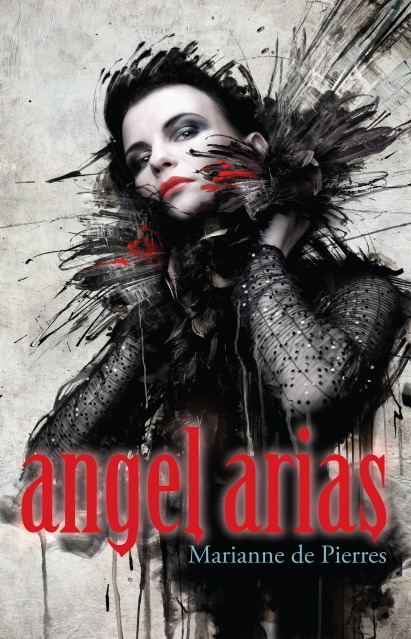Angel Arias by Marianne de Pierres is the sequel to the excellent YA gothic novel Burn Bright. Here is the blurb for Burn Bright from the series website burnbright.com.au (that .au is important, by the way):
Retra doesn’t want to go to Ixion, the island of ever-night, ever-youth and never-sleep. Retra is a Seal – sealed minds, sealed community. She doesn’t crave parties and pleasure, experience and freedom.
But her brother Joel left for Ixion two years ago, and Retra is determined to find him. Braving the intense pain of her obedience strip to escape the only home she’s ever known, Retra stows away on the barge that will take her to her brother.
When she can’t find Joel, Retra finds herself drawn deeper into the intoxicating world of Ixion. Come to me, whispers a voice in her head. Who are the Ripers, the mysterious guardians of Ixion? What are the Night Creatures Retra can see in the shadows? And what happens to those who grow too old for Ixion?
I really enjoyed Burn Bright and gave it 4.5 stars when I read it. My favourite aspects were Retra’s guts — she trains herself to endure pain to escape her ultra-conservative family! — and the world. Reading Angel Arias now, after having read a few other dystopian novels like Divergent (by Veronica Roth), I was struck by how much more organic the dystopia in de Pierres’ Night Creatures is. For example, in The Hunger Games, the inherent set up of the society leaves a lot of people miserable and, in my opinion, means that a revolution was inevitable, whether or not Katniss was present for it (to be fair, this is also implied in the books). However, in the mainstream society in the Night Creatures books, people on the surface aren’t so much oppressed as deeply religious and conservative. Yes, there’s more going on below the surface that we don’t learn about until later but still, aside from the odd geography, it feels like the sort of society that could arise naturally.
 Sure, not everyone is happy, especially not some of the teenagers, but that’s why they run away to Ixion, to party in an endless night. In many ways, running away from familial restrictions is a very typical response and doesn’t feel at all forced. Even the secret messages in the music and in the banned propaganda is exactly the sort of thing teenagers would be into. Of course, not everything is as it seems (or there wouldn’t be much story) but it felt more plausible than, for example, the artificially divided society in Divergent.
Sure, not everyone is happy, especially not some of the teenagers, but that’s why they run away to Ixion, to party in an endless night. In many ways, running away from familial restrictions is a very typical response and doesn’t feel at all forced. Even the secret messages in the music and in the banned propaganda is exactly the sort of thing teenagers would be into. Of course, not everything is as it seems (or there wouldn’t be much story) but it felt more plausible than, for example, the artificially divided society in Divergent.
Angel Arias picks up soon after Burn Bright left off. Retra, now calling herself Naif, scratched the surface of her world in Burn Bright and what she saw wasn’t quite what she expected. Now, she is determined to find out what’s going on and why.
I started reading Angel Arias about a year after I read Burn Bright and it took a little while for me to catch up with what was happening (mostly, I’d forgotten everyone’s names, so there were a few confused chapters in which I had to relearn who was who). There’s not many words wasted on introduction, so I recommend not waiting too long between books. (And the ending to Burn Bright should encourage you to pick up the next book quickly anyway.)
Angel Arias has more prolonged action than the first book and sort of less mystery. What I mean is, for most of the book, the same mysteries (about the world and about some the characters’ motivations) remain and the story focuses more on what I would loosely term an adventure. Some new characters are introduced and a vague (and non-YA-standard — Naif isn’t the apex) love triangle is set up.
I found the action portions of the novel (that is to say, all of it) well paced; it certainly had me turning the page and wondering who would get to the end of it unscathed. I was surprised at how much of the truth (probably) we learnt about the world by the end. I was expecting more mysteries to remain undiscovered until book three. That made it feel a little bit like Angel Arias was filling the gap between books one and three without spending quite as much time dwelling on the issues of identity and pleasure which were central to Burn Bright. On the other hand, that makes me hopeful that perhaps some of the other questions subtly hinted at in Angel Arias will be central to book three. I look forward to spending more time in the world.
I enjoyed Angel Arias but strongly recommend reading it after Burn Bright and not as a standalone. Book three, possibly called Blaze Dark, will hopefully be out by the end of the year (official release date TBC).
[Side note: I was originally going to count this towards the SF Australian Women Writers Challenge, because Burn Bright struck be as being more science fictional than magical, however. While I stand by that assessment, I feel the overall sensibilities aren’t strongly technological so I’ve decided to count Angel Arias towards my fantasy/misc AWWC.]
4 / 5 stars

No comments:
Post a Comment
Note: only a member of this blog may post a comment.